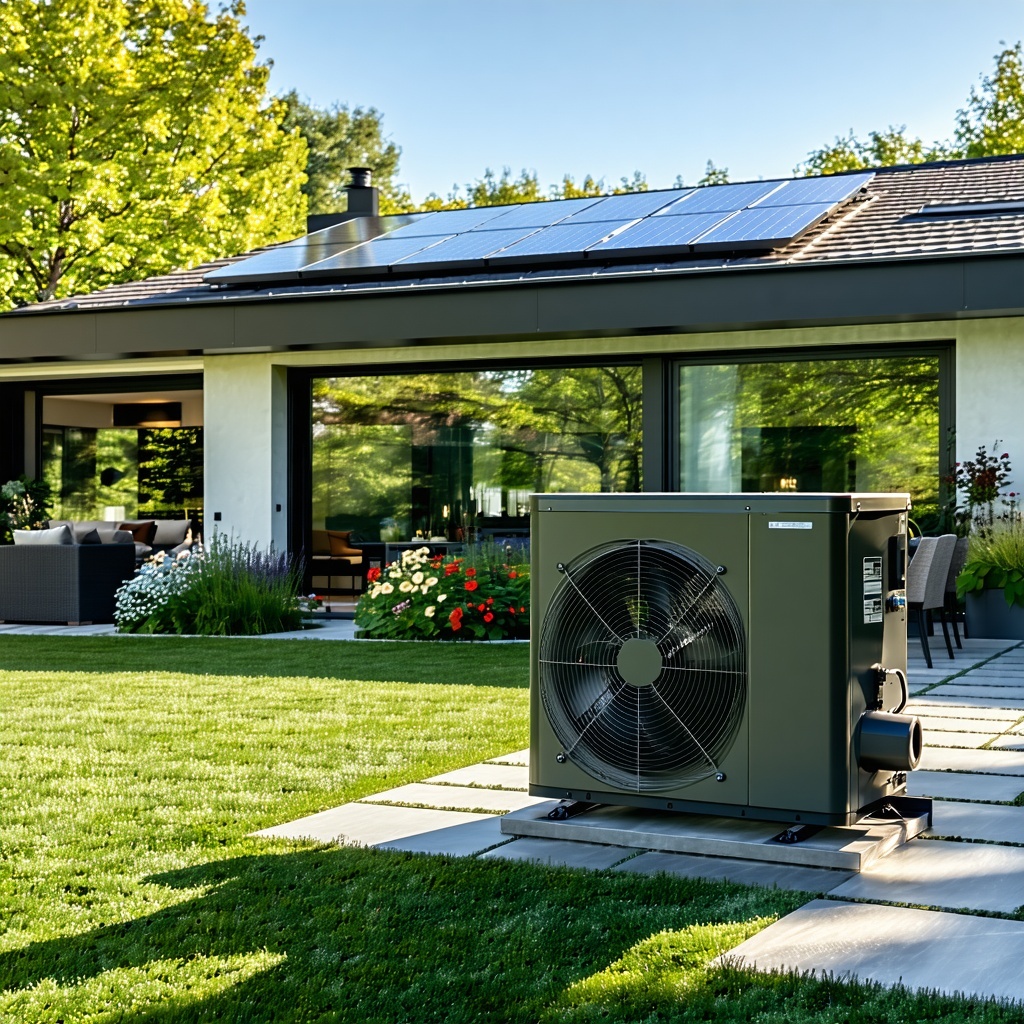
Air Source Heat Pumps: The Environmental Impact

Air Source Heat Pumps: The Environmental Impact
by Midland Renewables
Heating our homes contributes to over a third of the UK's carbon emissions—this is a significant issue but also a tremendous opportunity to make a change.
Switching to an air source heat pump (ASHP) is one of the most efficient ways to reduce carbon emissions and future-proof your property. It’s a cleaner, smarter, and more sustainable choice—one that an increasing number of UK homeowners are making.
At Midland Renewables, we specialise in designing and installing high-performance air source heat pump systems that benefit both you and the planet.
Looking to make your home or building more energy-efficient? Get in touch with us today to explore your options.
Environmental Impact No. 1: Reduced Carbon Emissions
Traditional boilers burn fossil fuels. Air source heat pumps don’t.
ASHPs work by extracting heat from the air—a renewable energy source—and using electricity to transfer it into your home. This means they can heat your property without emitting direct carbon.
For every unit of electricity used, an ASHP can generate up to three units of heat.
Even in colder weather, they remain efficient and reliable.
If your electricity comes from renewable sources, you’re heating your home with near-zero emissions.
The UK has committed to achieving net-zero emissions by 2050, and air source heat pumps are integral to this plan. Government projections expect millions of homes to adopt heat pumps by 2035 to meet these targets.
Environmental Impact No. 2: Improved Energy Efficiency
Energy efficiency is not just about using less energy—it’s about getting more from what you use.
This is where the Coefficient of Performance (CoP) comes into play. CoP measures how much heat a system produces compared to how much energy it consumes. For example, a heat pump might have a CoP of 2 in January and 4 in April.
The Seasonal Coefficient of Performance (SCOP) accounts for fluctuating temperatures over the year. An ASHP typically has a SCOP of 3-4, while a ground source heat pump (GSHP) has a SCOP of 4-5.
That’s 265% more efficient than a gas boiler.
At Midland Renewables, we design every system for optimal performance. This means choosing the right unit, controls, and integration with your home’s layout and insulation.
Interested in what’s possible? Check out how we design systems that work smarter, not harder.![]()
Environmental Impact No. 3: Lower Air Pollution
Clean heating means clean air.
Older boilers and wood-burning stoves release harmful gases and particles that pollute both indoor and outdoor air. These pollutants can build up in urban areas, affecting health and air quality.
On the other hand, air source heat pumps:
-
Don’t burn fuel.
-
Don’t release smoke or particulates.
-
Don’t contribute to indoor or outdoor air pollution.
This benefits both the planet and your health. As modern building regulations increasingly favour cleaner systems, by switching to an ASHP, you're ahead of the curve—and breathing easier too.
Environmental Impact No. 4: Sustainable Heating for All Seasons
One system. All year round.
Air source heat pumps aren’t just for heating—they can also provide cooling in the summer. This offers numerous advantages:
-
No need for a separate air conditioner.
-
Less strain on the grid during peak demand.
-
Lower bills over time.
Pair your ASHP with solar panels, and you’ll further reduce your energy consumption. These systems work hand-in-hand, particularly in well-designed homes.
Want to know how solar panels and heat pumps complement each other? Get in touch to learn more.
How to Pair an Air Source Heat Pump with Solar Panels
Our team at Midland Renewables designs integrated systems to maximise your roof space, orientation, and usage patterns. Need assistance? We can help make it work for you.
Pairing your ASHP with solar panels allows you to:
-
Generate electricity for your heat pump.
-
Reduce reliance on the grid.
-
Dramatically cut running costs.
This is a fantastic option for self-builds and extensive retrofits. With the right setup, you can almost entirely heat and cool your home using renewable energy.
Financial Incentives and Support
Concerned about the initial cost? Don’t worry, there’s support available.
The Boiler Upgrade Scheme provides up to £7,500 towards the installation of an air source heat pump in England and Wales.
Plus, you’ll save on running costs—especially with energy prices fluctuating.
Find out more about the Boiler Upgrade Scheme.
Additional Advantages of Air Source Heat Pumps
Still not convinced? Here are more reasons to make the switch:
-
Long Lifespan: A well-maintained system can last 15–20 years.
-
Quiet Operation: Modern units are designed for near-silent operation—many are quieter than 45-60dB.
-
Versatile Applications: Compatible with underfloor heating, radiators, and hot water tanks.
-
Space-Saving: No need for bulky fuel tanks or storage.
-
Safe and Clean: No flames, carbon monoxide, or flues.
It’s a smart investment for any modern home.
Debunking Common Myths About ASHPs
You may have heard some misconceptions about air source heat pumps—let’s set the record straight:
-
“They don’t work in cold weather.”
Not true. Modern systems work efficiently even at -20°C.
-
“They’re noisy.”
Latest models are designed for quiet operation—many operate at just 45-60dB. -
“They’re only for new builds.”
ASHPs can be installed in both new and existing homes. A proper design makes all the difference. -
“They cost too much.”
With grants and lower running costs, ASHPs are more affordable than you might think. -
“They don’t heat water well.”
Integrated systems can provide all the hot water your household needs—efficiently and reliably to 60°C.
Are Heat Pumps the Future of Home Heating?
Absolutely.
They’re clean, efficient, and scalable. They’re better for your home, health, and the environment. As the UK works towards net zero, heat pumps are set to become the standard.
At Midland Renewables, we believe homes should be built for the future, not just for today. That’s why we design every system with long-term performance in mind.
Reduce Your Carbon Footprint Today
Ready to make a real impact?
An air source heat pump is one of the most effective steps you can take to reduce your home’s carbon emissions and energy use.
We’ll guide you through the entire process—from design and product selection to full installation and ongoing support.
Ready to take the next step? Contact Midland Renewables now to design and install your ideal air source heat pump system.


